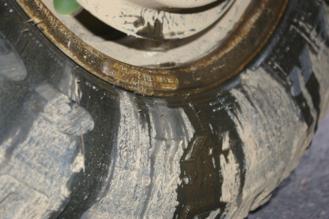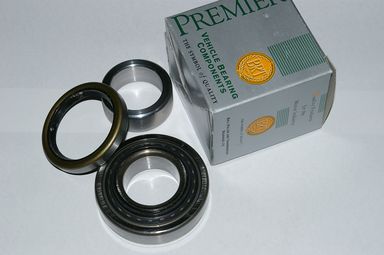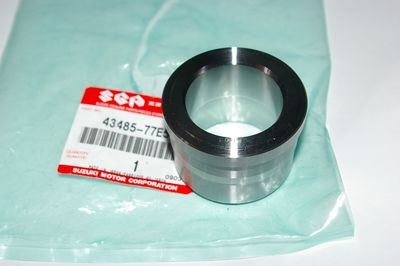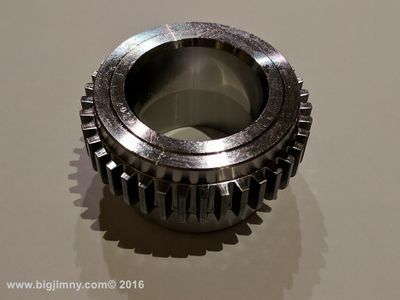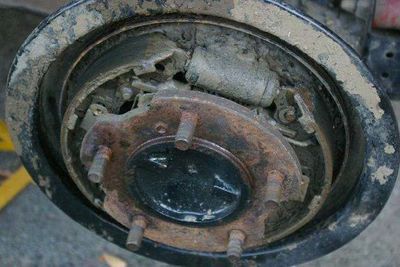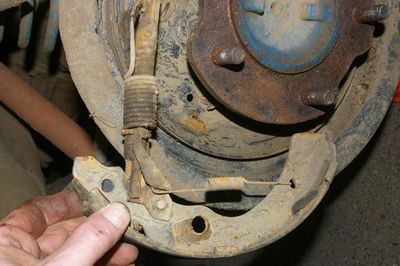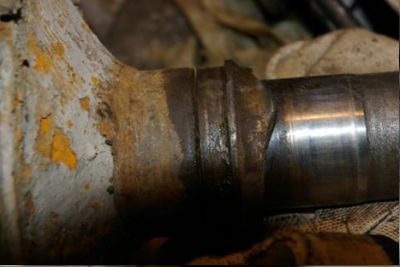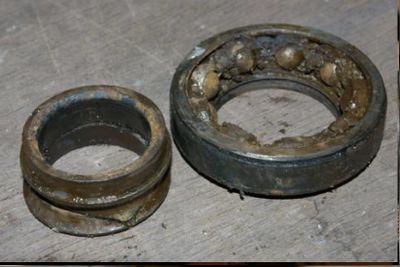Difference between revisions of "Rear wheel bearing replacement"
m (Minor chapter name adjustment) |
m (Increased the display size of all the pictures) |
||
| Line 16: | Line 16: | ||
| − | [[File:oilleaks1.jpg |thumb|left| | + | [[File:oilleaks1.jpg |thumb|left|400px|Figure 01 - Typical symptom of failure]] |
<br clear=all> | <br clear=all> | ||
| Line 39: | Line 39: | ||
| − | [[File:Rear_Wheel_Bearing_Kit.jpg|thumb|left|384px|An example of a non-ABS Jimny rear wheel bearing kit]] | + | [[File:Rear_Wheel_Bearing_Kit.jpg|thumb|left|384px|Figure 02 - An example of a non-ABS Jimny rear wheel bearing kit]] |
* The non-ABS kit has a plain bearing retainer ring. | * The non-ABS kit has a plain bearing retainer ring. | ||
<br clear=all> | <br clear=all> | ||
| − | [[File:Rear_Wheel_Bearing_Kit_ABS.jpg|thumb|left|384px|An example of an ABS Jimny rear wheel bearing kit]] | + | [[File:Rear_Wheel_Bearing_Kit_ABS.jpg|thumb|left|384px|Figure 03 - An example of an ABS Jimny rear wheel bearing kit]] |
* The ABS kit has a retainer ring with an ABS ring installed. | * The ABS kit has a retainer ring with an ABS ring installed. | ||
* Some ABS kits have a retainer ring with the ABS ring, whilst other have the ring as an integral part. | * Some ABS kits have a retainer ring with the ABS ring, whilst other have the ring as an integral part. | ||
| Line 52: | Line 52: | ||
| − | <gallery widths=" | + | <gallery widths="400px" heights="300px" class="center"> |
| − | Old_retainer.jpg|Old retainer ring | + | Old_retainer.jpg|Figure 04 - Old retainer ring |
| − | ABS_retainer.JPG|Full ABS retainer | + | ABS_retainer.JPG|Figure 05 - Full ABS retainer |
</gallery> | </gallery> | ||
| − | |||
<br clear=all> | <br clear=all> | ||
| Line 150: | Line 149: | ||
| − | [[File:Rear drum.jpg|thumb|left| | + | [[File:Rear drum.jpg|thumb|left|400px|Figure 06 - Jimny rear drum]] |
* First of all secure the car. | * First of all secure the car. | ||
| Line 161: | Line 160: | ||
| − | [[File:Drum_removal.jpg|thumb|left| | + | [[File:Drum_removal.jpg|thumb|left|400px|Figure 07 - Using bolts to remove drum]] |
* If the drum is stuck, then first of all check that the brake system (cable, shoes, etc.) is not stuck. | * If the drum is stuck, then first of all check that the brake system (cable, shoes, etc.) is not stuck. | ||
| Line 172: | Line 171: | ||
<br clear=all> | <br clear=all> | ||
| − | [[File:Rear_brake_shoes.jpg | + | [[File:Rear_brake_shoes.jpg|thumb|left|400px|Figure 08 - Drum removed]] |
* With the drum removed, the brake shoes can be seen (covered in mud in this case!). | * With the drum removed, the brake shoes can be seen (covered in mud in this case!). | ||
| Line 182: | Line 181: | ||
| − | [[File:Shoes_lower_spring.jpg|thumb|left| | + | [[File:Shoes_lower_spring.jpg|thumb|left|400px|Figure 09 - Lower spring]] |
* Use a small pair of pliers and remove the small spring that connects across the base of the brake shoes. | * Use a small pair of pliers and remove the small spring that connects across the base of the brake shoes. | ||
<br clear=all> | <br clear=all> | ||
| − | [[File:Shoes_adjuster_spring_2.jpg|thumb|left| | + | [[File:Shoes_adjuster_spring_2.jpg|thumb|left|400px|Figure 10 - Adjuster Spring]] |
* Use a pair of molegrips to remove the strong spring that joins the top of the shoes with the adjuster. | * Use a pair of molegrips to remove the strong spring that joins the top of the shoes with the adjuster. | ||
| Line 195: | Line 194: | ||
<br clear=all> | <br clear=all> | ||
| − | [[File:Shoes_retainer_clip.jpg|thumb|left| | + | [[File:Shoes_retainer_clip.jpg|thumb|left|400px|Figure 11 - Shoe retainer]] |
* Use a pair of pliers and twist the end of the shoe retaining pin until the spring clip is released. | * Use a pair of pliers and twist the end of the shoe retaining pin until the spring clip is released. | ||
<br clear=all> | <br clear=all> | ||
| − | [[File:Shoe_assembly_removal.jpg|thumb|left| | + | [[File:Shoe_assembly_removal.jpg|thumb|left|400px|Figure 12 - Shoe removal]] |
* Now the shoes will lift away. | * Now the shoes will lift away. | ||
| Line 206: | Line 205: | ||
<br clear=all> | <br clear=all> | ||
| − | [[File:Handbrake_cable.jpg|thumb|left| | + | [[File:Handbrake_cable.jpg|thumb|left|400px|Figure 13 - Handbrake cable]] |
* Release the end of the handbrake cable from the arm on the shoe. | * Release the end of the handbrake cable from the arm on the shoe. | ||
<br clear=all> | <br clear=all> | ||
| − | [[File:Brake_cable_retainer.jpg|thumb|left| | + | [[File:Brake_cable_retainer.jpg|thumb|left|400px|Figure 14 - Handbrake cable retainer]] |
* The handbrake cable is held into the brake backing plate by an expanding spring clip around the cable. | * The handbrake cable is held into the brake backing plate by an expanding spring clip around the cable. | ||
| Line 218: | Line 217: | ||
<br clear=all> | <br clear=all> | ||
| − | PICTURE REQUIRED | + | PICTURE REQUIRED for Figure 15 |
* You then need to remove the brake pipes from the cylinder. | * You then need to remove the brake pipes from the cylinder. | ||
| Line 229: | Line 228: | ||
| − | [[File:Backplate_bolts.jpg|thumb| | + | [[File:Backplate_bolts.jpg|thumb|400px|left|Figure 16 - Backplate bolts]] |
* The hub is retained by four bolts on the rear. | * The hub is retained by four bolts on the rear. | ||
| Line 235: | Line 234: | ||
| − | PICTURE REQUIRED | + | PICTURE REQUIRED for Figure 17 |
* The hub can now be removed. | * The hub can now be removed. | ||
| Line 243: | Line 242: | ||
<br clear=all> | <br clear=all> | ||
| − | [[File:Rear_axle_oil_seal.jpg | + | [[File:Rear_axle_oil_seal.jpg|thumb|400px|left|Figure 18 - Rear axle oil seal]] |
* With the hub pulled, you can then see the oil seal and oil splash protector in the axle. | * With the hub pulled, you can then see the oil seal and oil splash protector in the axle. | ||
| Line 253: | Line 252: | ||
| − | [[File:Bearing retainer.jpg|thumb| | + | [[File:Bearing retainer.jpg|thumb|400px|left|Figure 19 - Bearing retainer]] |
* The old bearing is held in place by a retainer ring which needs cutting off. | * The old bearing is held in place by a retainer ring which needs cutting off. | ||
<br clear=all> | <br clear=all> | ||
| − | [[File:Cut_bearing_retainer.jpg|thumb| | + | [[File:Cut_bearing_retainer.jpg|thumb|400px|left|Figure 20 - Cutting the bearing retainer]] |
* The best way seems to be to cut it away with an angle grinder. | * The best way seems to be to cut it away with an angle grinder. | ||
| Line 264: | Line 263: | ||
<br clear=all> | <br clear=all> | ||
| − | [[File:Stuck inner race.jpg|thumb| | + | [[File:Stuck inner race.jpg|thumb|400px|left|Figure 21 - Stuck inner race]] |
* With the retainer cut away, you should be able to remove the remains of the bearing. | * With the retainer cut away, you should be able to remove the remains of the bearing. | ||
| Line 270: | Line 269: | ||
<br clear=all> | <br clear=all> | ||
| − | [[File:Collapsed bearing.jpg|thumb| | + | [[File:Collapsed bearing.jpg|thumb|400px|left|Figure 22 - Collapsed bearing]] |
* The damage to mine is clear! | * The damage to mine is clear! | ||
<br clear=all> | <br clear=all> | ||
| − | [[File:New rear bearing.jpg|thumb| | + | [[File:New rear bearing.jpg|thumb|400px|left|Figure 23 - New bearing]] |
*This is what a new bearing should look like. | *This is what a new bearing should look like. | ||
| Line 294: | Line 293: | ||
| − | + | {{Edited}} | |
[[Category:Howto]][[Category:Steering]] | [[Category:Howto]][[Category:Steering]] | ||
| − | |||
| − | |||
Revision as of 08:41, 15 January 2019
![]() The content of any article might be expanded / improved in the future - revisit it sometimes.
The content of any article might be expanded / improved in the future - revisit it sometimes.
![]() Seen a mistake? Know something that isn't written? Edit and change this article yourself!
Seen a mistake? Know something that isn't written? Edit and change this article yourself!
![]() Some images in the article (if present) can be enlarged by clicking on them.
Some images in the article (if present) can be enlarged by clicking on them.
Contents
Introduction
The Rear Wheel Bearings on a Jimny can be prone to wearing, particularly when used off-road. The drum brake backing plate is supposed to provide protection for the bearing but it is very poor and you can expect the bearing to fail VERY regularly if the vehicle is used in muddy/watery conditions.
Providing you have the correct tools, the replacement work can be a straight forward task.
The symptoms of worn Rear Wheel bearings:
- Grating/Grinding as you rotate a jacked up wheel
- Oil/Grease leaking from rear of drum
- Wheel falling off (yes, really, comes out complete with driveshaft!)
Bearing kits
You will need a suitable bearing kit for your car.
Two kit types are available:
- A kit for non-ABS Jimnys;
- A kit for ABS-equipped Jimnys;
![]() Don't know what ABS is? Educate yourself by reading this!
Don't know what ABS is? Educate yourself by reading this!
Common notes for both kit types:
- Both types have the same wheel bearing specifications and half shaft oil seal specifications.
- The "only" difference between the kit types is that the bearing retainer in the ABS kit is much more sophisticated.
- That is why ABS kits are much more expensive than non-ABS kits.
- The fitment procedure for an ABS kit is the same as for a non-ABS kit.
- Don't try to skimp by using a (much cheaper) non-ABS kit on a ABS-equipped Jimny - it won't fit.
- The non-ABS kit has a plain bearing retainer ring.
- The ABS kit has a retainer ring with an ABS ring installed.
- Some ABS kits have a retainer ring with the ABS ring, whilst other have the ring as an integral part.
![]() I have sold a number of different kits over the years and found the quality of the retainer ring varies, with some cheap kits being very poor quality.
I have sold a number of different kits over the years and found the quality of the retainer ring varies, with some cheap kits being very poor quality.
Prerequisites
Before embarking onto any work, first comes the overview of the prerequisites.
Required parts
The table
| Part name | Quantity | Suzuki P.N. | Aftermarket replacements | Comments |
|---|---|---|---|---|
| Wheel bearing |
1 piece | 09269-35009 | Various | Suzuki actually uses Koyo "DG357222DWC4" bearing under the stated OEM P.N. |
| Bearing retainer ring (non-ABS) |
1 piece | 43485-73000 | Various | For non-ABS Jimnys only!! This part is usually available in the aftermarket only in a set together with the bearing. |
| Bearing retainer ring (ABS) |
1 piece | 43485-76J00 | Various | For ABS-equipped Jimnys only!! This part is usually available in the aftermarket only in a set together with the bearing. |
| Oil seal | 1 piece | 09283-48007 | Various Dimensions: 48x62x9 mm |
Seals the differential oil on the rear half shaft from pouring from inside the axle towards the wheel. This part is usually available in the aftermarket already in a set together with the bearing. |
| Oil seal protector |
1 piece | 43588-73000 | ? | Usually does not need replacing, but if you find out that yours is damaged, now you know the replacement part number. |
| Bearing grease |
A fistful or so |
? | Various | Sometimes comes together with the bearing (otherwise use a high quality grease which is suitable for the application). |
| A calendar with pictures of (half)naked women |
12 pictures / months |
Probably with portraits of Suzuki's female employees |
|
|
Parts offered in BigJimny Store
The BigJimny Store has the following parts from the above table on sale:
- A "bearing + retainer + oil seal" kit for non-ABS Jimnys;
- A "bearing + retainer + oil seal" kit for ABS-equipped Jimnys;
- Sorry, no calendars with pictures of naked women (nor men for that matter) are in store's offer (yet)!
Required tools
Replacement procedure
Removing the drum
- First of all secure the car.
- Release the wheel nuts and jack up the car and remove the road wheel.
- This then reveals the brake drum.
- The drum on the picture has a spacer fitted to it.
- With all the wheel bolts removed, the drum can be pulled forward and off the hub.
- If the drum is stuck, then first of all check that the brake system (cable, shoes, etc.) is not stuck.
- Then insert two small bolts in the holes in the face of the drum.
- Reach around the back and feel near the top for a rubber bung.
- Remove the rubber bung and insert a flat bladed screwdriver.
- Angle the screwdriver so that the blade is pointing to the back of the car and the handle towards the front.
- You should be able to feel the adjuster wheel.
- Using the screwdriver turn the adjuster downwards a few clicks. Then gradually tighten the bolts you inserted in the front, the drum should come off.
- With the drum removed, the brake shoes can be seen (covered in mud in this case!).
- As the hub has to come off to change the bearings you need to remove the brake assembly.
Removing the shoes
- Use a small pair of pliers and remove the small spring that connects across the base of the brake shoes.
- Use a pair of molegrips to remove the strong spring that joins the top of the shoes with the adjuster.
- Make a careful note of how the adjuster is fitted.
- The rod has a forked end and on part of the fork has a step in it.
- Make careful note of how this fork is fitted.
- Use a pair of pliers and twist the end of the shoe retaining pin until the spring clip is released.
- Now the shoes will lift away.
- Take care not to loose the little adjuster arm and its small spring.
- Release the end of the handbrake cable from the arm on the shoe.
- The handbrake cable is held into the brake backing plate by an expanding spring clip around the cable.
- The clip needs to be squeezed, so the cable can be pulled out complete with the clip.
- This is not easy to do but will come out with persistence.
PICTURE REQUIRED for Figure 15
- You then need to remove the brake pipes from the cylinder.
- Undo the pipes and catch the drips of brake fluid.
- There is one pipe if you are doing the passenger side and two pipes if you are doing the drivers side.
Removing the Hub
- The hub is retained by four bolts on the rear.
PICTURE REQUIRED for Figure 17
- The hub can now be removed.
- The unit is a friction fit into the axle casing.
- Attach a slide hammer to the hub and pull it out by using the slide hammer action.
- Alternatively refit the wheel or old wheel or brake drum (backwards) and hit the hub from behind to drive it off.
- With the hub pulled, you can then see the oil seal and oil splash protector in the axle.
- Hook the old seal out, clean up the axle and push the new seal supplied with the kit into place.
Removing the Bearing
- The old bearing is held in place by a retainer ring which needs cutting off.
- The best way seems to be to cut it away with an angle grinder.
- I do not know of anyone who has removed it in a different way.
- With the retainer cut away, you should be able to remove the remains of the bearing.
- As you can see in the picture, my bearing had collapsed and left the inner race on the axle .
- The damage to mine is clear!
- This is what a new bearing should look like.
- Note that it has a built in "spacer" on one edge, this should be to the OUTSIDE of the hub/wheel.
Re-assembly
This section needs completing but essentially it is a reverse procedure of above.
Torque Settings
Full details of the torque settings can be found in the reference data
Page last edited on 15/01/2019 by user Bosanek
